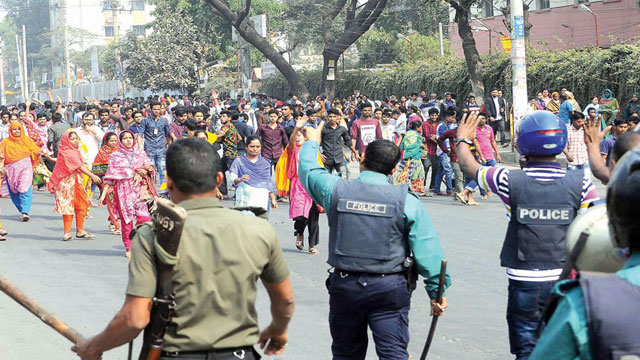Human Rights Watch (HRW) has said Bangladesh's authorities should investigate garment workers' and union leaders' allegations of arbitrary dismissals and false criminal cases, following recent protests demanding a wage hike.
In a statement issued on Tuesday, HRW said global garment brands sourcing from Bangladesh should investigate these allegations and call for an end to all forms of intimidation of workers.
Brands currently sourcing from Bangladesh are: H&M, KiK, Tchibo, Lidl, Mango, Next, Matalan, VF, Takko, ALDI, Marks & Spencer, Esprit, Walmart, JCPenny, and Tesco.
According to the statement, union leaders reported that at least 7,500 garment workers were dismissed from their jobs after strikes in January.
It said some of those dismissed were accused of vandalism and looting, but the allegations appeared broad and vague.
Meanwhile, at least 29 criminal cases were filed naming 551 individuals, as well as over 3,000 unidentified people. Over 50 workers have been arrested, 11 of whom were denied bail.
“Bangladesh has made international pledges to ensure worker safety and protect their rights, but is falling short of its commitments when workers strike to demand a livable wage,” Phil Robertson, deputy Asia director at HRW, said.
He added: “Factories in Bangladesh should not use false criminal complaints and mass terminations to stifle workers’ collective action.”
Over 50,000 garment workers—in the Dhaka, Ashulia, Narayanganj, Savar, and Gazipur districts—went on strike in December and again in January, protesting wage changes that went into effect December 1, 2018.
An RMG worker was killed and several others were injured during the protests.
HRW interviewed eight witnesses of a clash, fourteen dismissed workers, and three union leaders; and also reviewed lists of fired workers and dismissal notices posted on the factories.
Later, on February 7, H&M released a statement calling for “respectful negotiation and peaceful dispute resolution,” and regular revision of the minimum wage level in Bangladesh.
H&M also signed a Memorandum of Understanding with factory management, associated trade unions, and worker representatives to ensure that “documents and agreements that have now been signed are acknowledged and approved by all parties, outlining valid information, and appropriate grounds for termination of employment” for the workers who were dismissed from the three factories that produce for H&M.
Phil Robertson, deputy Asia director at HRW, said: “The Bangladesh government should instead demonstrate to the international community—and the customers of its US$36 billion garment industry—that it is serious about committing to workers’ rights and safety.”
In response to the protests, the government formed a tripartite committee to review garment workers' wages, and on January 13 announced modest increases for lower and mid-range worker grades, although the minimum wage of Tk8,000 (US$96) per month remained unchanged.
HRW said when workers tried to return to work, they were met with mass dismissals and arrests.
Under international human rights law, any penalties for participating in an illegal strike should be proportionate to the offense or fault committed.
Human Rights Watch considers dismissal for exercising the right to strike a disproportionate disciplinary sanction. The International Labour Organization (ILO) considers sanctions for participating in strikes acceptable only when national law itself is consistent with international standards on freedom of association.
The ILO committee charged with interpreting the application of the international labor standards, the Committee of Experts on the Application of Conventions and Recommendations, has stated that “sanctions for strike action, including dismissals, should be possible only where strike prohibitions are in conformity with the principles of freedom of association.” The committee has repeatedly held the Bangladesh Labour Act to be in violation of ILO conventions on freedom of association and collective bargaining.
While the right to strike is not absolute in international law, and thus may be subject to certain restrictions, the ILO Committee on Freedom of Association has “made it clear that [the right to strike] is a right which workers and their organizations (trade unions, federations and confederations) are entitled to enjoy,” and that any restrictions on this right “should not be excessive,” and that the “legitimate exercise of the right to strike should not entail prejudicial penalties of any sort, which would imply acts of anti-union discrimination.”





